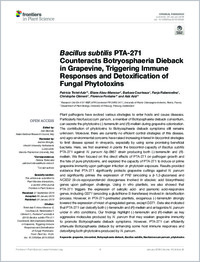Bacillus subtilis PTA-271 counteracts Botryosphaeria dieback in grapevine, triggering immune responses and detoxification of fungal phytotoxins
- Trotel-Aziz, Patricia University of Reims Champagne-Ardenne, Reims, France
- Abou-Mansour, Eliane Department of Plant Biology, University of Fribourg, Switzerland
- Courteaux, Barbara University of Reims Champagne-Ardenne, Reims, France
- Rabenoelina, Fanja University of Reims Champagne-Ardenne, Reims, France
- Clément, Christophe University of Reims Champagne-Ardenne, Reims, France
- Fontaine, Florence University of Reims Champagne-Ardenne, Reims, France
- Aziz, Aziz University of Reims Champagne-Ardenne, Reims, France
- 24.01.2019
Published in:
- Frontiers in Plant Science. - 2019, vol. 10, p. 25
English
Plant pathogens have evolved various strategies to enter hosts and cause diseases. Particularly Neofusicoccum parvum, a member of Botryosphaeria dieback consortium, can secrete the phytotoxins (-)-terremutin and (R)-mellein during grapevine colonization. The contribution of phytotoxins to Botryosphaeria dieback symptoms still remains unknown. Moreover, there are currently no efficient control strategies of this disease, and agro-environmental concerns have raised increasing interest in biocontrol strategies to limit disease spread in vineyards, especially by using some promising beneficial bacteria. Here, we first examined in planta the biocontrol capacity of Bacillus subtilis PTA-271 against N. parvum Np-Bt67 strain producing both (-)- terremutin and (R)-mellein. We then focused on the direct effects of PTA-271 on pathogen growth and the fate of pure phytotoxins, and explored the capacity of PTA- 271 to induce or prime grapevine immunity upon pathogen infection or phytotoxin exposure. Results provided evidence that PTA-271 significantly protects grapevine cuttings against N. parvum and significantly primes the expression of PR2 (encoding a β-1,3-glucanase) and NCED2 (9-cis-epoxycarotenoid dioxygenase involved in abscisic acid biosynthesis) genes upon pathogen challenge. Using in vitro plantlets, we also showed that PTA-271 triggers the expression of salicylic acid- and jasmonic acid-responsive genes, including GST1 (encoding a glutathione-S-transferase) involved in detoxification process. However, in PTA-271-pretreated plantlets, exogenous (-)-terremutin strongly lowered the expression of most of upregulated genes, except GST1. Data also indicated that PTA-271 can detoxify both (-)- terremutin and (R)-mellein and antagonize N. parvum under in vitro conditions. Our findings highlight (-)-terremutin and (R)-mellein as key aggressive molecules produced by N. parvum that may weaken grapevine immunity to promote Botryosphaeria dieback symptoms. However, PTA-271 can efficiently attenuate Botryosphaeria dieback by enhancing some host immune responses and detoxifying both phytotoxins produced by N. parvum.
- Faculty
- Faculté des sciences et de médecine
- Department
- Département de Biologie
- Language
-
- English
- Classification
- Biological sciences
- License
-
License undefined
- Identifiers
-
- RERO DOC 324094
- DOI 10.3389/fpls.2019.00025
- Persistent URL
- https://folia.unifr.ch/unifr/documents/307470
Statistics
Document views: 119
File downloads:
- pdf: 210
